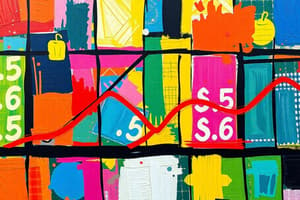Podcast
Questions and Answers
What is the increase in the overall level of prices called?
What is the increase in the overall level of prices called?
Inflation
What is it called when the price level falls?
What is it called when the price level falls?
Deflation
What is an extraordinarily high rate of inflation called?
What is an extraordinarily high rate of inflation called?
Hyperinflation
What determines the value of money?
What determines the value of money?
What theory is used to explain the long run determinants of the price level and inflation rate?
What theory is used to explain the long run determinants of the price level and inflation rate?
What happens when the Fed doubles the supply of money?
What happens when the Fed doubles the supply of money?
What is the principle that states monetary changes do not affect real variables?
What is the principle that states monetary changes do not affect real variables?
What is the Fisher effect?
What is the Fisher effect?
The quantity of money (M) times the velocity of money (V) equals the price of output (P) times the amount of output (Y). This is known as the __________.
The quantity of money (M) times the velocity of money (V) equals the price of output (P) times the amount of output (Y). This is known as the __________.
Which economic thinker is associated with the Fisher effect?
Which economic thinker is associated with the Fisher effect?
Flashcards are hidden until you start studying
Study Notes
Money Growth and Inflation
- Inflation is characterized by a general increase in prices, while deflation indicates a decrease in price levels.
- Hyperinflation refers to extremely high inflation rates, exemplified by Zimbabwe's inflation reaching 24,000% in February 2008.
Classical Theory of Inflation
- The quantity theory of money, a classical economic principle, focuses on long-run determinants of price levels and inflation rates.
- Two perspectives on the economy's overall price level are the level of prices and the value of money.
Money Supply, Demand, and Equilibrium
- The value of money is influenced by its supply and demand in the economy.
- Understanding the determinants of money supply and demand is crucial for establishing monetary equilibrium.
Effects of Monetary Injection
- A significant increase in money supply, such as doubling it, leads to changes in the equilibrium price level.
- The quantity theory posits that the money supply is the main driver of inflation, encapsulated in Milton Friedman's assertion that inflation is fundamentally a monetary phenomenon.
Classical Dichotomy and Monetary Neutrality
- Monetary changes affect nominal variables (measured in monetary units) and not real variables (measured in physical units), highlighting the classical dichotomy.
- Monetary neutrality implies that changes in the money supply do not affect real economic outcomes, such as production or employment.
Velocity and the Quantity Equation
- The velocity of money is the rate at which money circulates within the economy.
- The quantity equation is expressed as M × V = P × Y, connecting the money supply (M) and money velocity (V) to the nominal value of output (P × Y).
The Fisher Effect
- An increase in money growth leads to a higher inflation rate without affecting real variables, due to the principle of monetary neutrality.
- The Fisher effect describes the one-for-one adjustment of nominal interest rates to inflation rates, resulting in both higher inflation and nominal interest in the long run.
Costs of Inflation
- Inflation can lead to reduced purchasing power, a concept known as the inflation fallacy.
- Additional costs associated with inflation include shoeleather costs (the cost of reducing cash holdings) and menu costs (the costs related to changing prices).
Studying That Suits You
Use AI to generate personalized quizzes and flashcards to suit your learning preferences.



